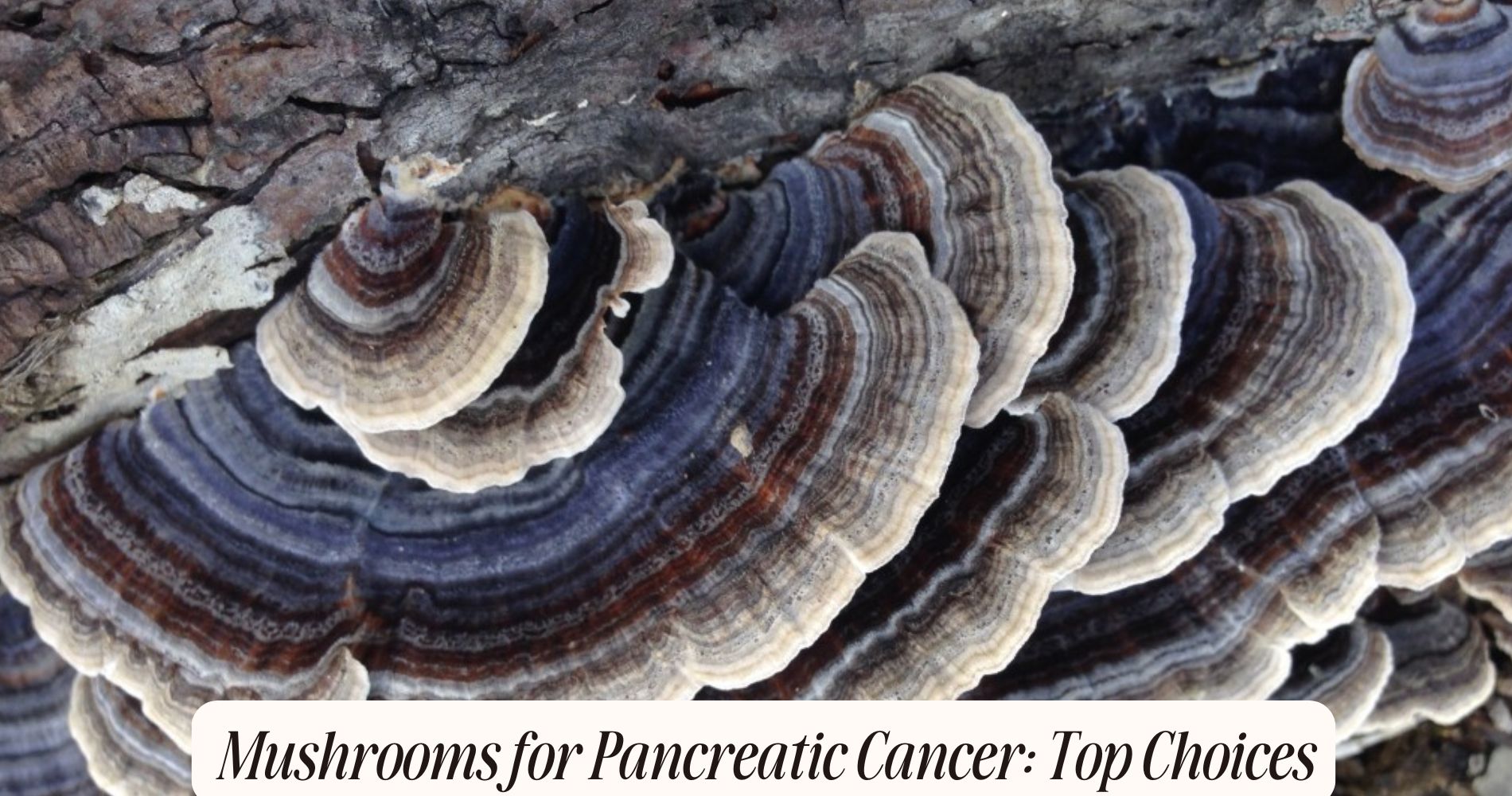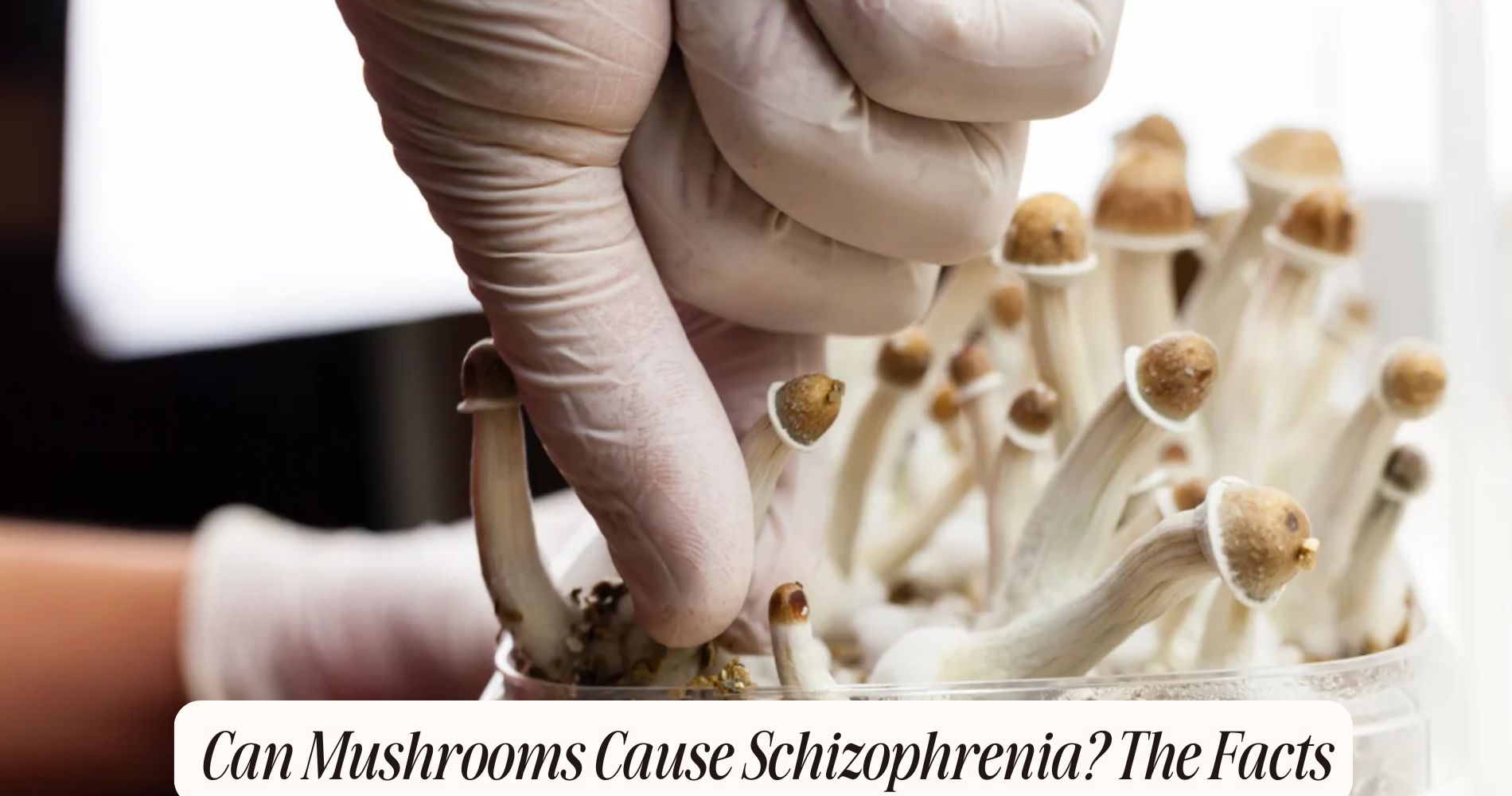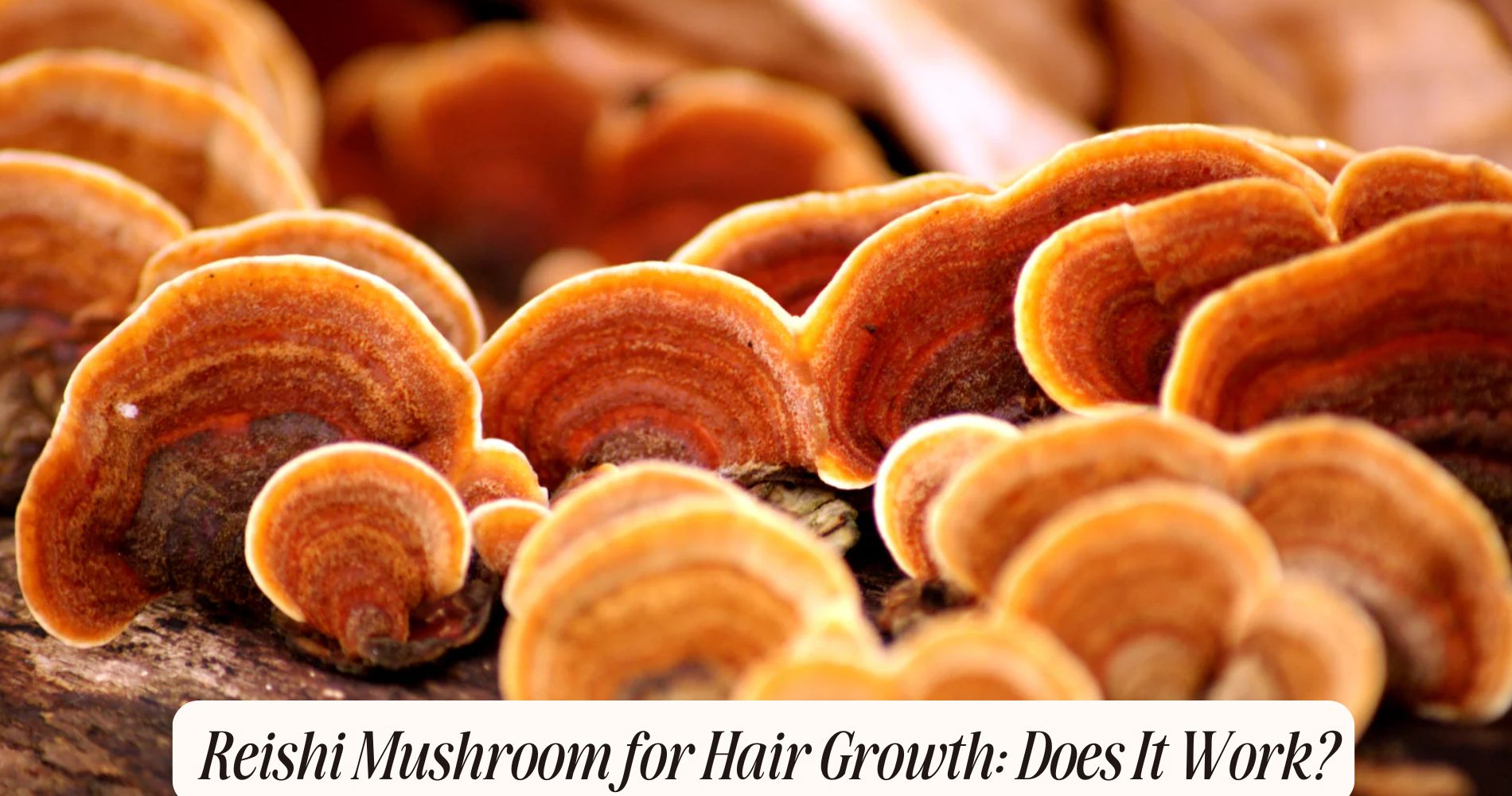
Mushrooms for Pancreatic Cancer: Top Choices
If you're considering mushrooms for pancreatic cancer, focus on Reishi, Shiitake, and Turkey Tail. Reishi enhances immune function and may alleviate chemotherapy side effects. Shiitake is rich in lentinans that support immune response and may inhibit tumor growth. Turkey Tail contains polysaccharopeptides linked to improved immune response and survival rates in gastrointestinal cancers. Maitake, Chaga, and Lion's Mane also show promise in supporting immune health and inducing apoptosis in cancer cells. Incorporating these mushrooms into your diet can enhance your overall health during treatment. There's more detail on their specific benefits waiting for you.
Benefits of Mushrooms in Cancer Care
Exploring the role of mushrooms in cancer care reveals significant potential benefits, particularly for patients facing pancreatic cancer. Studies indicate that certain mushroom varieties, such as Shiitake, Maitake, and Turkey Tail, contain bioactive compounds that may enhance immune function and exhibit anti-tumor properties.

These compounds, including polysaccharides and triterpenoids, have shown promise in laboratory settings for inhibiting cancer cell proliferation and inducing apoptosis in malignant cells.
Incorporating these mushroom varieties into your diet could play a role in cancer prevention strategies. Research suggests that regular consumption of mushrooms is associated with lower cancer risk, likely due to their high antioxidant content and ability to modulate inflammatory pathways.
For patients with pancreatic cancer, the immunomodulatory effects of mushrooms may also support overall treatment efficacy by improving the body's resilience against chemotherapy-induced side effects.
While more clinical trials are necessary to fully establish the therapeutic roles of specific mushroom varieties, preliminary findings underscore their potential as complementary agents in cancer care.
Reishi Mushroom Overview
Reishi mushroom (Ganoderma lucidum), often referred to as the "mushroom of immortality," is recognized for its potential health benefits, particularly in oncology.
Research indicates that reishi possesses various bioactive compounds, including triterpenes and polysaccharides, which exhibit immunomodulatory, anti-inflammatory, and antioxidant properties. These attributes suggest a role in supporting immune function, which is vital for individuals undergoing cancer treatment.
In terms of reishi benefits, studies have shown that it may enhance the efficacy of chemotherapy while mitigating some of its side effects. For instance, reishi has demonstrated the ability to improve the quality of life for cancer patients by reducing fatigue and anxiety levels.
Furthermore, its potential to induce apoptosis in cancer cells positions it as a promising adjunct in cancer therapies.
When considering reishi usage, it can be consumed in various forms, including capsules, powders, and teas. It's important to consult healthcare professionals for appropriate dosing and to guarantee it complements your treatment plan.
Shiitake Mushroom Properties
Shiitake mushrooms possess a rich nutritional profile, offering essential vitamins and minerals that support overall health.
Their bioactive compounds, such as lentinans, have shown significant potential in modulating immune responses, which may be beneficial in the context of pancreatic cancer.
Understanding these properties can help you appreciate the role shiitake mushrooms might play in a thorough dietary approach to cancer management.
Nutritional Profile Overview
A variety of nutrients found in shiitake mushrooms contribute greatly to their therapeutic potential, particularly in the context of pancreatic cancer. These mushrooms are rich in essential vitamins and minerals, such as B vitamins (including B2, B3, and B5), which are significant for energy metabolism and cellular function.
Additionally, shiitake mushrooms provide significant amounts of copper, selenium, and zinc, all of which play important roles in antioxidant defense and immune regulation.
The macronutrient profile of shiitake mushrooms is also remarkable. They contain low calories and are primarily composed of carbohydrates and protein, making them a beneficial addition to a balanced diet.
Furthermore, shiitake mushrooms are classified among the top mushroom varieties for their health benefits, as they contain polysaccharides, which may enhance immune responses.

In addition, the fiber content in shiitake mushrooms promotes gut health and aids in digestion, which is essential for patients undergoing treatment for pancreatic cancer.
Incorporating shiitake mushrooms into your diet can help you harness these nutritional benefits, supporting overall health during challenging times.
Bioactive Compounds Impact
The therapeutic potential of shiitake mushrooms extends beyond their impressive nutritional profile, largely due to their bioactive compounds.
These compounds, including lentinans and eritadenine, exhibit significant therapeutic effects, particularly in the context of cancer treatment. Lentinan, a polysaccharide found in shiitake, has garnered attention for its ability to enhance immune function and inhibit tumor growth. Research indicates that lentinan can activate various immune cells, leading to an increased anti-tumor response.
Eritadenine, another bioactive compound, has been shown to possess cholesterol-lowering properties and may contribute to overall metabolic health, which is vital for individuals dealing with cancer. The combination of these bioactive compounds provides a multifaceted approach to supporting health during cancer treatment.
Additionally, shiitake mushrooms contain antioxidants, such as selenium and ergothioneine, which can mitigate oxidative stress in cells. This is particularly important since oxidative stress can exacerbate cancer progression.
Immune System Support
Incorporating shiitake mushrooms into your diet can greatly bolster your immune system due to their rich array of bioactive compounds. These mushrooms contain lentinans, which enhance the immune response by activating immune cells such as macrophages and T-cells.
Research shows that regular consumption of shiitake and other mushroom varieties can lead to significant health benefits, particularly for individuals undergoing cancer therapies.
Dietary recommendations often include shiitake mushrooms as part of a balanced diet aimed at supporting immune function. Their polysaccharides contribute to a strengthened immune system, making them a valuable addition to holistic approaches for health.
Alongside lifestyle changes like improved nutrition and stress management, shiitake mushrooms can play a pivotal role in fostering resilience against illnesses.
For those unable to consume sufficient amounts through food, supplement options are available that provide concentrated doses of these beneficial compounds.
When integrating shiitake mushrooms into your regimen, you're not just enhancing flavor but also actively participating in a proactive strategy for immune support, particularly important for individuals facing the challenges of pancreatic cancer.
Turkey Tail Mushroom Research
While ongoing research highlights the potential benefits of Turkey Tail mushroom (Trametes versicolor) in supporting pancreatic cancer treatment, clinical studies underscore its role as an adjunctive therapy. Turkey Tail contains polysaccharopeptides, particularly PSP and PSK, which have demonstrated immunomodulatory effects. These compounds can enhance immune response and may improve the efficacy of conventional cancer therapies.
In various clinical trials, patients receiving Turkey Tail alongside standard treatments reported improved immune function and quality of life. For instance, a study published in the Journal of Clinical Oncology found that patients with gastrointestinal cancers who incorporated Turkey Tail exhibited increased survival rates compared to those who did not.
Additionally, Turkey Tail's potential to mitigate chemotherapy-related side effects has garnered attention. By supporting the immune system, it may help patients tolerate treatments better, thereby contributing to overall cancer therapy effectiveness.

While Turkey Tail shouldn't replace standard cancer treatments, its incorporation as a complementary agent may offer valuable support. Consequently, consulting with a healthcare provider about integrating Turkey Tail into your cancer therapy regimen could be beneficial for enhancing treatment outcomes.
Maitake Mushroom Benefits
Maitake mushrooms have demonstrated significant immune system support through their rich content of beta-glucans, which enhance immune cell activity.
Additionally, research indicates that these mushrooms possess anti-cancer properties, potentially inhibiting tumor growth and promoting apoptosis in cancer cells.
Understanding these benefits can inform therapeutic strategies for individuals facing pancreatic cancer.
Immune System Support
Harnessing the unique properties of Maitake mushrooms can greatly bolster immune system function, making them a valuable ally in the fight against pancreatic cancer.
These mushrooms are renowned for their immune modulation effects, which play a significant role in enhancing your body's defense mechanisms. Research indicates that the active compounds in Maitake, particularly beta-glucans, stimulate various immune cells, including macrophages and T-cells, promoting a more robust immune response.
Among the myriad of mushroom varieties, Maitake stands out due to its ability to balance the immune system, helping to prevent both overactivity and underactivity. This balance is vital for individuals facing cancer, as an optimized immune response can aid in recognizing and eliminating abnormal cells.
Studies have demonstrated that regular consumption of Maitake mushrooms may lead to increased levels of cytokines, which are essential for cell signaling in the immune system.
Incorporating Maitake mushrooms into your diet could provide significant benefits, potentially enhancing your overall health and resilience during cancer treatment. Their immune-supportive properties make them a remarkable addition to any dietary regimen aimed at traversing the challenges associated with pancreatic cancer.
Anti-Cancer Properties
The anti-cancer properties of Maitake mushrooms can markedly contribute to therapeutic strategies for pancreatic cancer. Research indicates that these mushrooms contain bioactive compounds, such as beta-glucans, which enhance immune response and may directly inhibit tumor growth. In clinical studies, Maitake mushroom extracts have demonstrated the ability to induce apoptosis in cancer cells, suggesting a significant role in cancer prevention.

Additionally, various mushroom varieties, including Maitake, have shown promise in modulating inflammatory pathways associated with tumor progression. By reducing chronic inflammation, these mushrooms may create a less favorable environment for cancer development.
Moreover, Maitake's potential to enhance the efficacy of conventional therapies—such as chemotherapy—adds to its therapeutic profile.
You can incorporate Maitake mushrooms into your diet, either through dietary supplements or culinary use, to leverage their potential health benefits. Regular consumption may not only support your immune system but also play a role in cancer prevention strategies, particularly for those at risk of pancreatic cancer.
As always, consult with healthcare professionals before introducing any new supplement to your regimen, ensuring it aligns with your overall treatment plan.
Chaga Mushroom Potential
While research into the potential benefits of chaga mushrooms (Inonotus obliquus) is still emerging, preliminary studies suggest they may offer promising therapeutic effects for pancreatic cancer.
Chaga mushrooms contain a variety of bioactive compounds, including polysaccharides, triterpenes, and phenolic acids, which have garnered attention for their potential anti-cancer properties.
Chaga benefits are particularly significant due to their ability to modulate immune responses and inhibit tumor growth. For instance, studies indicate that certain chaga compounds can induce apoptosis in cancer cells while sparing healthy tissue, a vital factor in cancer treatment.
Additionally, the antioxidant properties of chaga may help mitigate oxidative stress associated with tumor progression.
In vitro studies have shown that chaga extracts can suppress the proliferation of pancreatic cancer cells, suggesting a potential role in therapeutic interventions.
Furthermore, the anti-inflammatory properties of chaga compounds may further contribute to its efficacy in combating pancreatic cancer by creating a less favorable microenvironment for tumor growth.
Although more rigorous clinical trials are needed to establish definitive conclusions, the current evidence points towards chaga mushrooms as a promising adjunctive therapy in the fight against pancreatic cancer.
Lion's Mane Mushroom Insights
Lion's Mane mushroom (Hericium erinaceus) has gained attention for its potential neuroprotective and anti-cancer properties, particularly in the context of pancreatic cancer.
Research indicates that lion's mane contains bioactive compounds such as hericenones and erinacines, which may promote nerve growth factor synthesis. This could lead to improved cognitive enhancement, making it a topic of interest for both neurological health and cancer therapy.
In vitro studies have shown that lion's mane extracts can induce apoptosis in pancreatic cancer cells, suggesting a mechanism by which it may inhibit tumor growth. Additionally, its anti-inflammatory properties may contribute to a reduced tumor microenvironment, further supporting its potential in a cancer prevention strategy.

The mushroom's ability to cross the blood-brain barrier enhances its appeal for neurodegenerative disease prevention, aligning with findings that cognitive decline can be exacerbated by chronic stress and inflammation—factors often present in cancer patients.
Consequently, incorporating lion's mane into your regimen could provide dual benefits: supporting cognitive function while potentially mitigating cancer progression.
As always, consult healthcare professionals before introducing any new supplement, especially in the context of serious conditions like pancreatic cancer.
How to Incorporate Mushrooms
Incorporating mushrooms into your diet can enhance both nutritional value and potential therapeutic benefits, particularly for those looking to support health during cancer treatment. Various mushroom species, such as shiitake, maitake, and reishi, possess bioactive compounds that may aid immune function and reduce inflammation.
To effectively integrate mushrooms, explore diverse mushroom recipes that highlight their unique flavors and textures. For instance, you could sauté sliced shiitake mushrooms with garlic and olive oil as a side dish or blend them into soups for added depth.
Cooking techniques such as grilling or roasting can intensify their umami flavor, making them a delightful addition to salads or grain bowls. Additionally, consider incorporating mushroom powders into smoothies or sauces for a convenient nutrient boost.
Always verify you source mushrooms from reputable suppliers to avoid potential toxins. By adopting these methods, you not only enhance the nutritional profile of your meals but also potentially leverage the therapeutic properties of mushrooms to support overall health during treatment.
Remember to consult with your healthcare provider before making significant dietary changes, especially in the context of cancer treatment.
Boost Your Health with the Ultimate Wellness Bundle
Looking for an easy, delicious way to enhance your daily vitality? Try Well Gummies' Ultimate Wellness Bundle. This convenient gum chew form product includes All-in-One Mushroom Gummies, perfect for daily use like vitamins, and Lion's Mane Focus and Energy Gummies for whenever you need an extra boost. Enjoy the refreshing wild berry flavor without jitters or crashes—just calmer energy and a balanced mind, all day long!
Frequently Asked Questions
Can Mushrooms Interact With Pancreatic Cancer Medications?
Mushroom compounds can potentially affect medication absorption, influencing how well your pancreatic cancer medications work. It's crucial to consult your healthcare provider to understand any possible interactions and guarantee effective treatment outcomes.
Are There Any Side Effects of Consuming Medicinal Mushrooms?
Consuming medicinal mushrooms may cause side effects, though they're generally rare. Different mushroom varieties offer various health benefits, so you should monitor for allergic reactions or gastrointestinal issues, especially if you're new to these supplements.
How Should Mushrooms Be Prepared for Maximum Benefits?
To maximize nutritional benefits, you should use cooking methods like steaming or sautéing. These techniques preserve bioactive compounds while enhancing flavor, ensuring you gain the most health advantages from the mushrooms you consume.
Can Mushrooms Replace Traditional Cancer Treatments?
Mushrooms can't replace traditional cancer treatments. While mushroom efficacy shows promise in cancer research, they're best viewed as complementary therapies. Always consult your healthcare provider before considering any alternative treatments alongside standard protocols.
Where Can I Buy High-Quality Medicinal Mushrooms?
You can source high-quality medicinal mushrooms from reputable online retailers or specialized health shops. Look for established mushroom brands with third-party testing to guarantee purity and potency, supporting your health with reliable products.
Conclusion
Incorporating mushrooms like reishi, shiitake, turkey tail, maitake, chaga, and lion's mane into your diet may provide notable benefits for pancreatic cancer care. Their unique compounds exhibit potential anti-cancer properties, immune system support, and overall health enhancement. While further research is essential to establish definitive clinical outcomes, integrating these mushrooms into your nutrition plan could be a valuable adjunct to conventional treatment. Always consult your healthcare provider before making dietary changes in a cancer care regimen.




